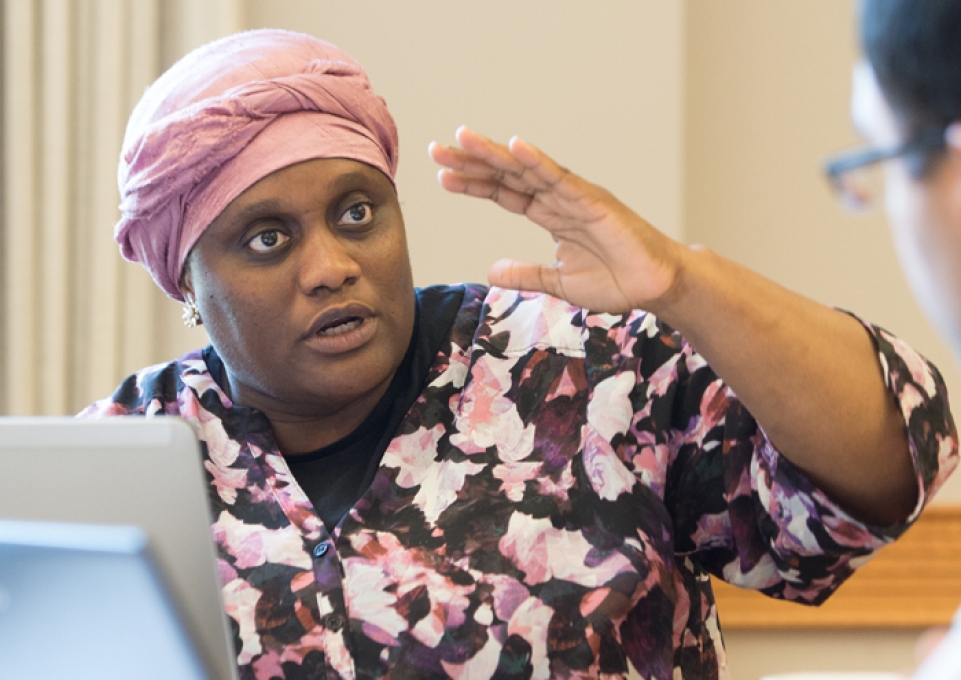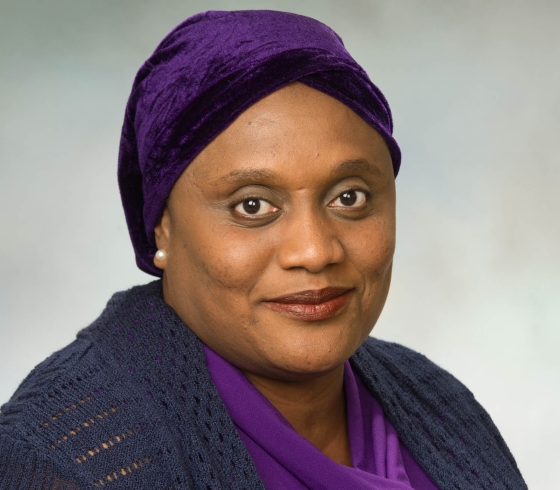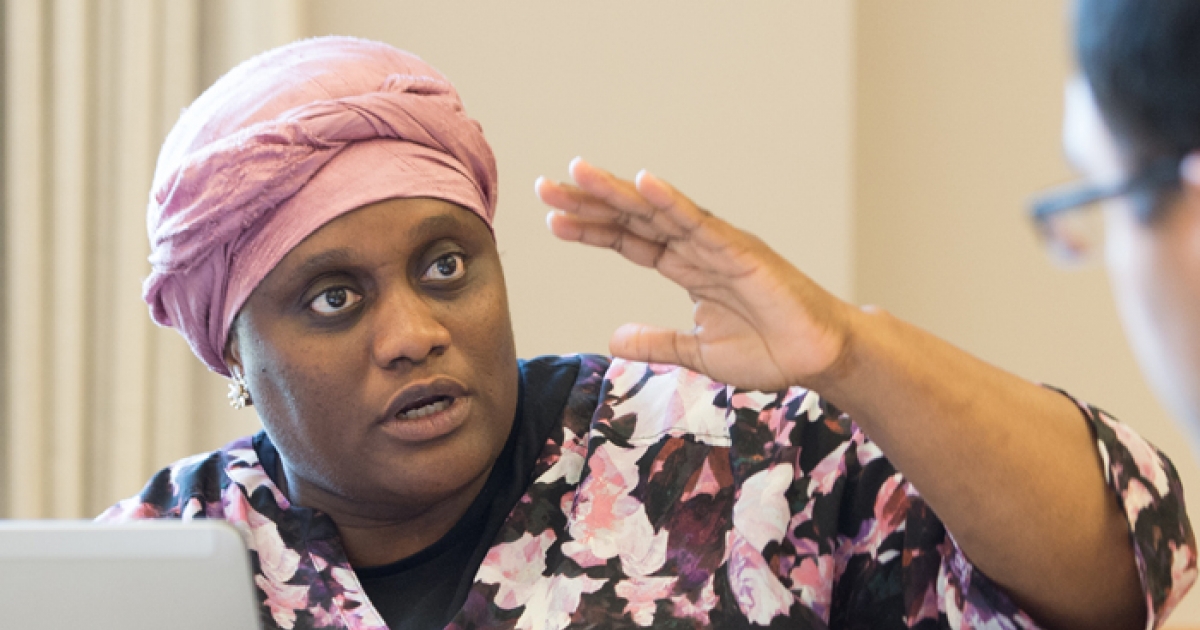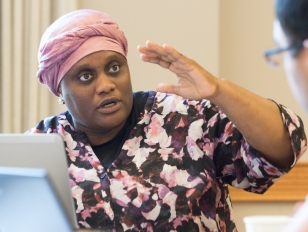
Atta Ceesay absorbed political science lessons at the knee of her father, a member of parliament in the West African country of Gambia who supported 14 children in two households.
“From a very young age, I was surrounded by people with nothing who all wanted something,” said Ceesay, the Buffalo State College associate professor who assumed the chair of the newly renamed Political Science and Public Administration Department in June. “I came to realize I didn’t like politics. I did, however, like the public arena.”
By the time Ceesay was ready to attend college, she already had an education in “sharing and caring” that would inform her academic career and life.

Going to school in the United States, as so many others in her country did, Ceesay earned a bachelor’s degree in business at Fairmont State College in West Virginia and a master of business administration (M.B.A.) from Governors State University in Illinois. She then launched an eight-year corporate career with the international paper goods company Kimberly-Clark. Along the way, she earned a second master’s degree in human resources. But something was amiss.
“I made a good living,” she said, “but I questioned myself: What difference was I making in the world?”
The answer inspired Ceesay to make a shift to academics with a focus on public administration. She earned a doctorate from Rutgers University and taught at Indiana University Northwest before joining Buffalo State in 2015. Her study of nonprofit organizations, especially in the areas of public policy, governance, and sustainability, influenced her approach to teaching and serving as coordinator of Buffalo State’s master of public administration and nonprofit management (M.P.A.) program.
Ceesay, who received the President’s Award for Excellence in Teaching in 2019, worked with other faculty members and M. Scott Goodman, interim dean of the School of Natural and Social Sciences, to elevate public administration and rename the department. This decision was partly fueled by an external review of the department last fall.
“The department, which was founded in the late 1960s, had been functioning as two separate divisions for years,” Ceesay said. “It made no sense to me for political science and public administration to be separate. We know that changing the name will amplify and bring to light the array and quality of programs we have.”
“While the M.B.A. teaches you how to run a business in the private sector, the M.P.A. trains civil servants. It teaches you how government functions, how to implement policies, and how to run different agencies.”
Over the past several years, the department has added not only the M.P.A. program but also a bachelor of arts in international relations, a graduate certificate in public management, and minors in public administration and international relations. The name change, Ceesay said, will heighten visibility of the M.P.A. program, which has gotten lost in the past.
“I think the undergraduate course of study should be a pipeline to the M.P.A.,” she said.
And this is one reason the department in 2018 decided to launch its 4+1 accelerated pathway to the M.P.A., which allows undergraduates majoring in political science and other subjects to take select graduate-level coursework toward an M.P.A. their senior year.
Integrating the department has also led to more faculty teaching within the M.P.A. When Ceesay joined the department, only two full-time faculty members did: Laurie Buonanno and Angelo Conorozzo. (Conorozzo died in 2016.) Now 11 department faculty members, plus affiliated faculty members from the Geography and Planning and Economics and Finance departments teach M.P.A. courses.
“We’ve added classes to make the curriculum stronger and more appealing, including teaching the kind of skills that employers want to see,” she said.
Ceesay is now leading the charge to get the M.P.A. program accredited with the Network of Schools of Public Policy, Affairs, and Administration (NASPAA). The organization approved the pre-accreditation application in September.
“Seeking accreditation is very important for recruitment and the program’s long-term sustainability,” Ceesay said, noting that three other M.P.A. programs within SUNY—Brockport, Albany, and Binghamton—are all accredited. “NASPAA accreditation will provide credibility to the program that will contribute to recruiting faculty and students.”
Although the process can take up to three years to complete, Ceesay is hopeful that Buffalo State can achieve accreditation within 18 months.
Bolstering the M.P.A. now is timely. The need for nonprofit managers is huge, especially in Western New York, which has a strong nonprofit sector, and the state of New York is the region’s largest single employer, according to Ceesay.
“While the M.B.A. teaches you how to run a business in the private sector, the M.P.A. trains civil servants,” she said. “It teaches you how government functions, how to implement policies, and how to run different agencies. In order to obtain higher-paying jobs in government and the nonprofit sector, you need an M.P.A.”
Going forward, Ceesay would like the department to add a bachelor of science in public administration, a 3+2 accelerated pathway program between Geography and Planning and the M.P.A., and a 3+3 accelerated pathway, connecting undergraduate political science study with coursework at the University at Buffalo Law School. Faculty members are working on those initiatives now.
“In the long term, these accelerated pathway programs will be very good for Buffalo State,” she said. “We’re attracting new students by giving them excellent opportunities. If we put the right things in place, we have a huge chance to build the department and market it to a larger segment of the population.”
Photos by Bruce Fox, campus photographer.



